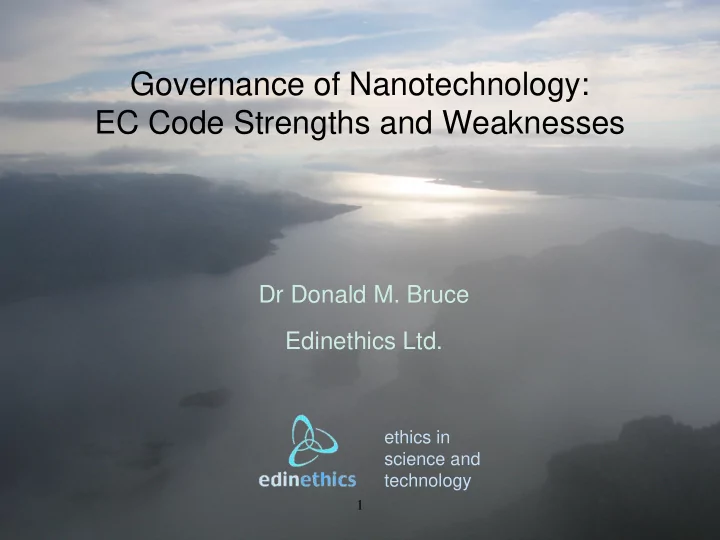

Governance of Nanotechnology: EC Code Strengths and Weaknesses Dr Donald M. Bruce Edinethics Ltd. ethics in science and technology 1
Nanotechnologies Human enhancement Stem cells & Cloning Human Genetics GM Food & Animals ethics in science and technology Climate Change Energy Policy Sustainable living Edinethics Ltd Tel: +44 (0)8456 444937 Risk and Ethics Email: info@edinethics.co.uk Patenting and Ethics Web: www.edinethics.co.uk Science and Society
EC FP6 Science and Society Nanobiotechnology: (formerly) Responsible Action on Issues in Society & Ethics Church of Scotland EC FP6 Network of Excellence in Nanobiotechnology Ethical, Legal and Social Aspects Board
6 Issues Raised by the NanoCode Badly worded Code : some absurd statements need re-drafting! • Societal Engagement : Who, How, When, Where? • – Serious communication gap with an uninformed (uninterested?) populace – Time needed to consider the issues – A mechanism to feed concerns back to decision makers Open and Pluralistic Forum (4.1.1) • Restrictions on Research (4.1.16) • Precaution and Proportion (4.1.17) • Patenting seems to trump ethical considerations – backwards! • 4
Reality Checks on Bad Wording Grand motherhood claims: impressive, good EC political messages but : unclarity, oxymorons, unreality, even absurdity • Unclarity : need to unpack what you mean (c.f. Royal Society code) – … “such as …” - another document needed – some guidelines are still too ‘arm-waving’ • Oxymoron : maximum flexibility <-???-> Maximum planning (3.6) • Unreality : 3.4 implies anyone “with a concern about nanotechnology” might demand to take part in selection panels of FP7 proposals • Absurdity : 4.1.12 making “all N&N knowledge” understandable only God could fulfill this? you probably meant “any” but you wrote “all” …. Risk of code being discredited – EC needs to re-draft some clauses 5
How does Governance do Societal Engagement? Currently only interested stakeholders come to the table • No organisation ‘speaks for the public’ – e.g. Greenpeace, Church – Risk of social scientists as ‘gurus’ who interprets what publics think – Normative questions of ethics aren’t answered by ‘consulting the public’ – Societal Engagement : Who, How, When, Where? • Serious communication gap with an uninformed (uninterested?) populace – Not many people will take time out to do so – How far ‘upstream’ can Nano public engagement realistically be? – People need time to consider new and challenging issues – What mechanisms to feed concerns back to decision makers? – Are these fit for purpose? – It is not realistic to expect extensive public engagement on nano • without major initiatives to stimulate it 6
Open and Pluralistic Forum (4.1.1) What is intended to fulfill this - nothing exists of this kind? • Implies forming a Standing Forum • Needs ongoing funding – Who should attend – selected experts, member state reps., stakeholders, – open? How should it look at issues – Is it an extension of this meeting? – Need to make clear about different roles : • How does this relate to the Foresighting task (4.1.19) – How do both relate to national or local Ethics Committees (if they exist) – 7
Restrictions on Research (4.1.16) Dual use : need to plug a current gap in the regulation of research • – Dual use definition is not just Medical – Military – It is now wider : also Medical – Human enhancement – This is not yet addressed by any existing EC mechanism – EC needs to address this : regulation, guidelines, or what? Human Enhancement restrictions ambiguous • – If this is a restriction it should be mandatory – Why only addictive non-therapeutic enhancements? – Need to apply to ‘doping’ enhancements outside sport – There are many others that are ethically problemmatic cognititive enhancement, brain chips, etc.? – The advice on research in this area needs looking at specifically 8
Exaggerated Precaution (3.3 ≠ 4.1.17) Guidelines lack the sense of proportion that is obligatory for applying precaution You cannot have the Precautionary Principle without the Proportionary Principle 4.1.17 is far too uncritically precautionary “research should be avoided involving deliberate intrusion of nano-objects into the human body” • No research with consuming milk or inhaling city air? • No clinical trials of nanodevices, coatings, diagnostic particles? • How do you test for humans long term, without testing in humans? • Who decides what is long enough term? 9
Summary messages on EC Nanocode To be realistic the general public on nanotechnology needs serious investment in effort and money How do we avoid only getting just “the usual stakeholders” Open and Pluralistic Forum – needs an ongoing funded body How are we to decide what should be no-go areas and enforce? Precaution has to be in proportion, and applied case-by-case The code needs making much more clear and needs substantial investment to be real!
Recommend
More recommend